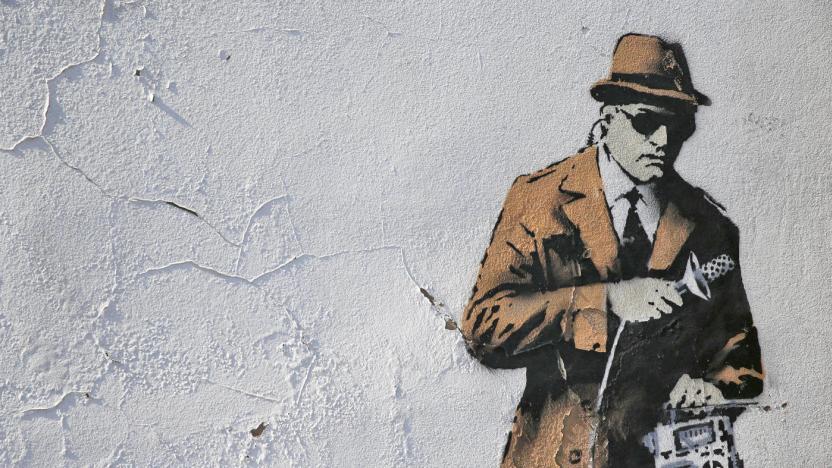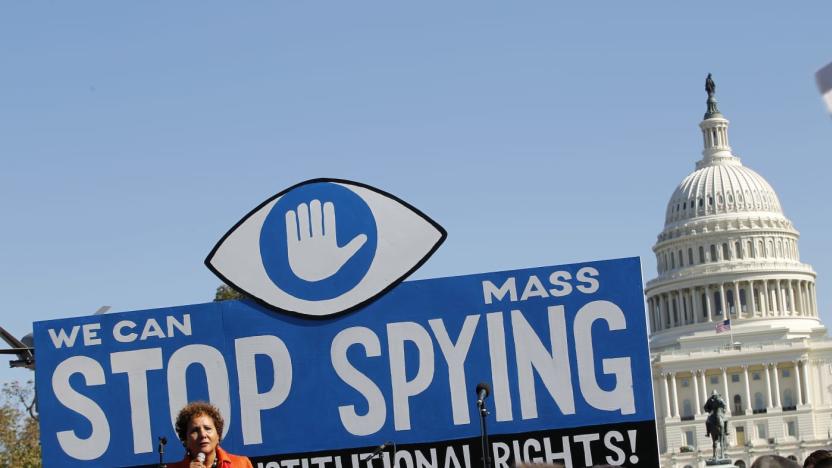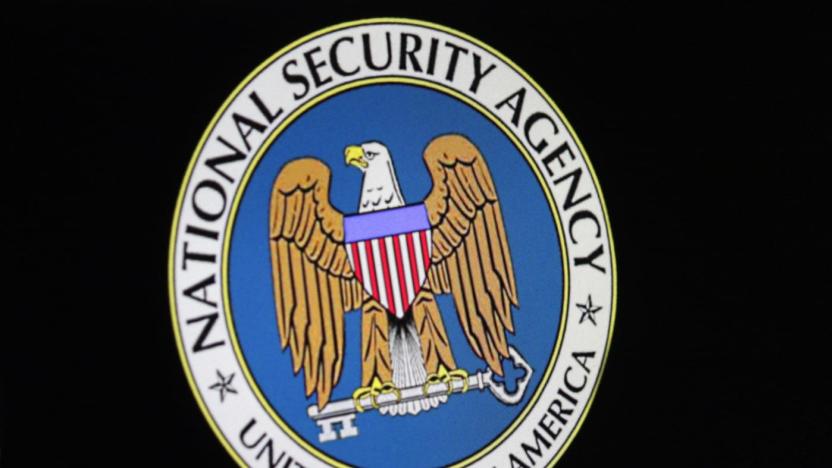spying
Latest

UK spies may have risked lives by collecting too much data
One of the common arguments against mass surveillance is that it could backfire: you might collect so much data that finding crucial info becomes difficult. As it turns out, that's a well-founded theory. A 2010 UK report leaked by Edward Snowden warned that MI5 spies were collecting so much data that there was a real risk of an "intelligence failure" where it would miss info that could save lives. Without enough staff and tools, it simply couldn't handle the sheer glut of raw surveillance content.

ISIS worries that fake Android apps are spying on its ranks
ISIS' attempts to disseminate its extreme message through mobile apps might be backfiring. Motherboard has learned that the group is warning members of fake, malware-laden versions of its Android apps that allegedly spy on users. While it's not clear who's creating the apps (besides "dubious sources"), it's implied that at least one government is trying to snoop on ISIS through unsuspecting members. Those militants can't just stick to 'official' sources to be safe, either -- ISIS' official channels frequently go down, so many of those backing the group's hateful cause have no choice but to go through unofficial routes.

Snowden did more to raise NSA concerns than officials claimed
For the longest time, US officials denied that Edward Snowden made serious attempts to raise concerns about NSA surveillance activities before he took off with classified data. There was only evidence of one not-so-worrisome email, they said. However, it's now clear that this isn't the whole story. Documents obtained by Vice News (and published by the NSA) show that Snowden likely did more to raise concerns with the NSA than officials claimed. While there's no smoking gun, two out of three previously unmentioned Snowden interactions with the Oversight and Compliance Office involved disputes over an open-book test on foreign intelligence gathering. The findings suggest that Snowden might have disagreed with the test's interpretation of the law, which would be in sync with the previously released email.

New phones let Japan's government secretly track its citizens
The Japan Times is reporting that local mobile network NTT DoCoMo is embracing government surveillance. The company launched five new smartphones on Tuesday that lets the authorities to track a user's location without their knowledge or consent. Existing handsets, however, currently alert a user when their position is being accessed by a third party. The move is in reaction to a change in the law back in June 2015 that withdrew the requirement to gain a subscriber's permission before sharing their GPS data.

Data breaches and spying fears are keeping people offline
Have countless data breaches and unfettered government surveillance left you nervous about doing things online? You're definitely not alone. The US National Telecommunications and Information Administration has conducted a survey revealing that nearly half of the Americans it surveyed (41,000 homes) have scaled back their internet activity over privacy and security fears. About 29 percent have avoided online finances, while 26 percent skipped online shopping. A similar amount decided against posting on social networks, and 19 percent even decided against offering "controversial" opinions online.

CIA and NSA doubled their searches for Americans' data in 2 years
So much for US intelligence scaling back its curiosity in the wake of Edward Snowden's leaks. An Office of the Director of National Intelligence transparency report has revealed that the CIA and NSA doubled the number of searches for the content of Americans' communications in an NSA database between 2013 and 2015. Where the two agencies made about 2,100 such requests three years ago, they searched 4,672 times last year. Just what triggered the spike isn't clear. There's a chance that some of the increase comes from repetitive searches (that is, running similar queries more than once), but they were also factors in 2013 -- the odds are that activity went up.

US surveillance court didn't reject a single spy order last year
For years, critics have claimed that the US' Foreign Intelligence Surveillance Court is a pushover: it's allegedly so reluctant to reject spying orders that it's little more than a speed bump for the FBI and NSA. True or not, that reputation isn't about to change any time soon. Reuters has obtained a Justice Department memo showing that FISC didn't reject any of the 1,457 surveillance order requests it received in 2015, even in part. That's no different than in 2014, but it suggests that the court isn't any less forgiving in an era of tighter government controls.

Congress asks the NSA how often it spies on Americans
Thanks in part to leaks, it's no secret that the National Security Agency's foreign intelligence gathering also covers some Americans. But just how many Americans are under watch, and how many are simply innocents caught in the crossfire? Congress wants to find out. The House Judiciary Committee has sent a letter giving Director of National Intelligence James Clapper until May 6th to provide a "rough estimate" of how many Americans are swept up in spying under the Foreign Intelligence Surveillance Act. While the NSA is supposed to keep the collection of US data to a minimum, it's not clear that the current approach is effective. There's a concern that many people are unnecessarily included, opening the door to abuse.

FTC issues warning to apps covertly monitoring TV broadcasts
It's like the those skeevy flashlight apps all over again. The Federal Trade Commission has sent out a warning to mobile software developers using the Silverpush framework that their applications could be invading the privacy of unknowing consumers. As Fortune notes, Silverfish and others of its ilk are why some apps that don't do anything in terms of voice transmission ask for permission to access your microphone. This alone sounds a bit creepy, but trust me, it gets even more gross.

Pentagon has deployed military drones in the US
If you were skeptical that the US military would only fly its drones in combat zones, your suspicions were well-founded -- although the situation isn't as bad as you might think. A recently published Department of Defense report has revealed that the Pentagon deployed spy drones in the US for non-military missions between 2006 and 2015. There were "less than twenty" of these flights, and the Department maintains that all of them obeyed laws restricting the use of these drones at home. While the document doesn't say what happened on those flights, the current policy forbids spying on US residents.

EFF scores a blow against the government's domestic spying
Before we knew that the National Security Agency was getting its jollies by spying via Prism, there was Jewel vs. NSA. That case, filed by Electronic Frontier Foundation, has gotten a boost from California judge Jeffrey White who's has granted discovery to the EFF -- something the EFF says it's been barred from since 2008. Not up on your legalese? Don't worry. Discovery is the step in a court case that allows all parties involved to go into trial with as much information as possible, without either party being able to keep secrets from one another. Unless said information would result in self-incrimination, it's a fact-finding stage.

NSA will unite divisions to better tackle online threats
The US' National Security Agency isn't as united as it looks at first glance. Its intelligence gathering division (the one that conducts mass surveillance and hacking) and cyberdefense groups are largely separate. And that creates real problems -- among other issues, the intel group might be exploiting security flaws that the defensive team doesn't even know about, leaving critical systems open to attack. Those walls are about to come down, however. The NSA is poised to unveil a reorganization that will merge its offensive and defensive capabilities, helping them coordinate the fight against digital threats.

US, UK intelligence agencies cracked Israeli drone data
The National Security Agency and the UK's Government Communication Headquarters have been hacking into Israeli drones to observe military operations and areas of interest in the Middle East, according to The Intercept. "Anarchist," as the program was called, saw technicians at a GCHQ facility in Cyprus routinely intercept video feeds over the course of several years, with some of the most telling bits winding up among the documents leaked by Edward Snowden.

California secretly listened to cellphone calls from the air
If you had cellphone problems in Orange County within the last few years, you may have been the unwitting victim of a secret cellphone surveillance program, according to the ACLU. Since 2009, the Anaheim Police Department has used the Dirtbox, a military-grade, Stingray-type device that can be mounted on light aircraft. While airborne, it mimics a cellphone tower in order to indiscriminately intercept and record thousands of cell phone calls.

House looks into claims the NSA spied on Congress
You're not the only one concerned that the National Security Agency might be spying on Congress... Congress is, too. The House Intelligence Committee says it's investigating claims that the NSA monitored communications between members of Congress and Israeli leadership as they discussed the Iran nuclear agreement. The Committee not only wants a point-by-point verification of the Wall Street Journal's original report, but to find out whether or not the NSA was following the rules.

The NSA spied on Congress, too
Just because the United States said it stopped spying on friendly foreign heads of state like Germany's Angela Merkel, doesn't mean that Uncle Sam actually has. Eavesdropping has actually continued and the list of targets included Israeli prime minister Benjamin Netanyahu, The Wall Street Journal reports. What's more, the National Security Agency was caught spying on members of Congress and American-Jewish groups as a direct result, according to WSJ's anonymous sources.

UK claims its spying bill will protect you from cyberbullies
When politicians want approval for controversial security measures, they sometimes like to lean on insecurities about your kids' safety -- the "won't somebody think of the children?" trope is so common that it became a joke in The Simpsons. And the British government isn't above using that tactic to get its draft Investigatory Powers Bill past critics, apparently. Home Secretary Theresa May tells a member of Parliament that the far-reaching surveillance legislation would help tackle the "pernicious" problems of cyberbullying and trolling. She claims that the bill would make it easier for police to pinpoint both the harassers and their victims, making it harder to threaten someone anonymously. See? Your young ones will be safer!

The thing you'd worry about happening in an Airbnb happened
Airbnb has been slapped with a lawsuit by a woman who alleges that the apartment that she rented was equipped with a spy camera. Yvonne Schumacher says that her and her partner spotted a light peeping from behind a bookshelf in the living room only after a few days of staying on the property. They found a wide-angle lens camera that was being controlled remotely and was capable of picking up audio and recording at night. By this point, however, the pair had already done what normal people do when they think they're in the private space.

Kazakhstan will require internet surveillance back doors
Want to know why it's a bad idea for the government to ask for back door access to your data? Here's why. As of January 1st, Kazakhstan will require the presence of a "national security certificate" on every internet-capable device in the country. The law will let the government spy on virtually any online traffic on devices with the certificate installed, whether or not it's encrypted. Carriers will have to keep tabs on users who don't install the code, too, so you can't count on slipping under the radar.

The NSA's mass US phone surveillance ends tonight
The National Security Agency's long-running mass phone surveillance program is coming to an end. As promised, the USA Freedom Act will forbid the NSA from indiscriminately collecting Americans' call metadata at midnight on November 29th. Agents will have to get court orders to collect data from telecoms regarding specific people or groups, and then only for six months at a time -- they can't just scoop up everything in case something useful turns up. The NSA will still have access to five years' worth of legacy data through February 29th, but that's as far as its access will go.




